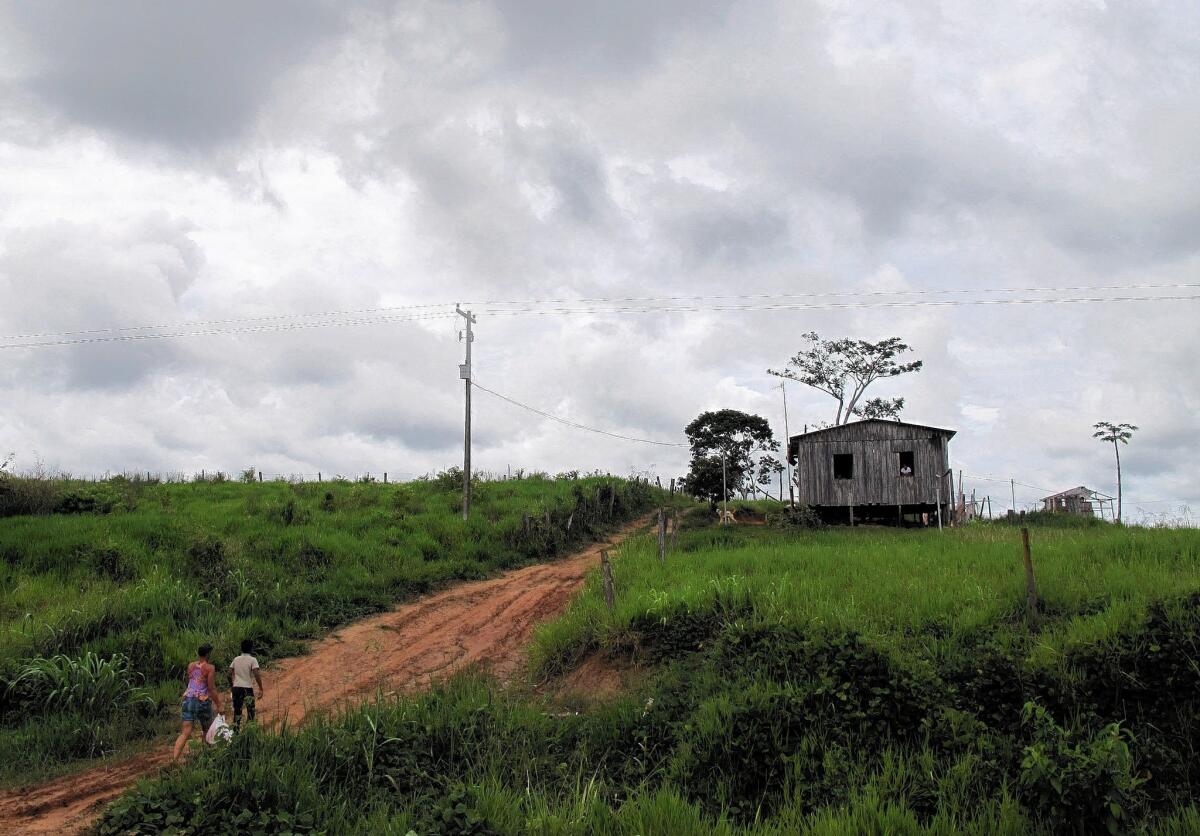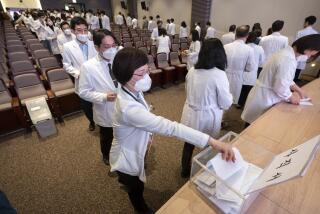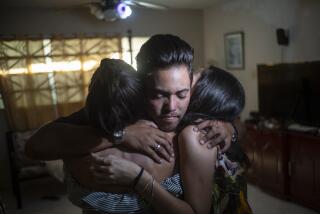Brazil’s president imports Cuban doctors to ease shortage

- Share via
RIO BRANCO, Brazil — Dr. Alberto Asael Reyes speaks Portuguese carefully when talking to his patients. He arrived in the Amazon region only recently from Cuba, and his accent remains strong. But in an area where there has long been no available physician, he often needs to introduce residents to new words and concepts.
“Rheu-ma-to-lo-gist,” Vinicius, a thin, shy 11-year-old, utters slowly after meeting with Reyes. Though Vinicius has had severe fevers and heart problems since birth, no one had told him he needed to see one.
“No one would come here,” says Maria Elena Brito da Silva, a teacher at the school down the road here in the outskirts of the city. “All the doctors stayed in their private practices in the city [center] making money.”
These days, patients receive free consultations with Reyes, 41, at this outlying government-run health center, among the first of a group of about 11,000 Cuban physicians headed to Brazil.
Faced with a severe shortage, the government of left-of-center President Dilma Rousseff is importing 13,000 foreign doctors by May to serve the poor and those in inadequately served rural areas.
Proponents say Brazil’s Mais Medicos (More Doctors) program, which has faced opposition from the country’s Medical Assn., is already providing relief.
“They’re being received very, very well by patients,” says Marcia Corsini, who is coordinating the new arrivals at the City Hall in Rio Branco, capital of the state of Acre. “In truth, we could use more of them soon.”
Brazil has seen a rapid increase in wealth during the last decade, and more than 40 million people have risen from poverty into the middle class. But as the country prepares to take the global stage as host of the 2014 World Cup, much of the population has not seen commensurate improvements in public services.
Brazil’s Constitution calls for free care for all citizens who have no private plan, but in reality that remains little more than a promise. Neglected communities, long lines and bloody tragedies are often easier to stumble upon than an available doctor.
The government says Brazil has 360,000 active doctors and can use 160,000 more. Most doctors are concentrated in the richest areas: The state of Rio de Janeiro has more than three doctors per 1,000 residents, compared with less than one per 1,000 people in Acre, far away on the Bolivian and Peruvian borders.
Many of the Cuban physicians are alumni of health export programs the socialist island runs in other nations, including Venezuela.
Mais Medicos participants provide primary care and are expected to serve for three years, while Brazil expands long-term plans to put more students in medical school.
A sizable controversy over the program is due in part to the politics of the Castro government and the way the Cubans are paid. Instead of paying the doctors directly, as Portugal and Bolivia do, Brazil has agreed to send the money to the Cuban government, which then pays them a small fraction of the $4,300 monthly salary.
Brazil’s government says Cuba has a similar deal with other countries and that it is administered in partnership with the Pan American Health Organization, the regional body of the World Health Organization.
The Cuban medical system was inspired by the legacy of Che Guevara, and doctors say they’re proud that it recognizes that “medical care is a human issue, not commerce, and being a doctor is not a vocation you choose to become rich,” Reyes says.
“I’m excited to live in Brazil, and being here is good for my career, as I can learn more,” says Dr. Geisell Martinez Torres, 35. “I can also do something that’s economically good for Cuba. Thanks to our country, we are doctors, and our children [in Cuba] are studying right now for free.”
Martinez and Dr. Alaide Duran Sosa, 45, are housed in a mansion with a swimming pool and are driven to work every day. But they already have their fair share of healthcare horror stories, and say the vast majority of people they treat have problems that could have easily been avoided through early intervention.
“We just barely saved one woman today,” says Martinez. “Someone had told her she had diabetes, and prescribed her medicine. So she stopped eating all food entirely, thinking she was only supposed to consume her medication. No one told her otherwise.”
Despite being less than half as rich as Brazil, Cuba ranks far above Brazil on the main international health indicators. Life expectancy in Cuba is 78, just behind that in the U.S. and far ahead of Brazil’s 74, which sits in the middle of international tables, according to the WHO. The infant mortality rate in Cuba is 4.76 per 1,000 live births, lower than in the U.S., at 5.9, and far lower than Brazil’s 19.83, according to the CIA World Factbook.
The Cuban focus on primary care aims at catching problems early. The doctors in Acre say they most often see hypertension, diabetes, gastritis and asthma, apart from vehicular and farming accidents.
“The people here need attention, and Cuban training is to treat the person as a whole human being, rather than to just treat a specific problem or disease,” says Reyes, finishing lunch outside in 100-degree heat, surrounded by flattened rain forest and grazing cattle. “The people are surprised here that we get close to them, that we touch them to see how they are.”
Opponents of President Rousseff say the program is overtly political, part of an election strategy.
Brazil’s Federal Medical Council recognizes serious problems in the nation’s healthcare system, but has vehemently opposed Mais Medicos, saying that the foreigners’ medical licenses haven’t been fully validated by local standards.
“It’s a process of hiring doctors without evaluating their competency, promoted with millions in marketing money,” says Dr. Carlos Vital, vice president of the Federal Medical Council.
Rousseff is relying on the popularity of the program to help support her reelection bid in October, analysts say, after her popularity took a hit during protests that spread throughout the country in June, many focusing on poor healthcare.
“The doctors [opposing the program] are just defending their economic interests, like a corporation,” counters Renato Fuverki, the health minister in the ranching town of Ji-Parana in Rondonia state. “There is no reason to criticize governments for boosting their popularity by providing better public services. That’s what politicians do.”
One official who asked not to be named said she’d prefer to fire some of the Brazilian doctors in her system who have neglected their public duties and replace them with Cubans, something which is explicitly prohibited by the program. “The doctors in our system are supposed to work 40 hours a week. Sometimes they only show up for 15 hours,” she said.
Ji-Parana has already received 17 new doctors, which has meant a 20% increase in the local force, but Fuverki says more are needed, preferably specialists.
“The system we have is not enough,” says an angry Lindalva Dutra de Medeiros, waiting outside Ji-Parana’s public hospital for news of her grandfather, who had suffered a stroke. The staff was left unable to use monitoring equipment when the hospital lost power for hours. “The program with the Cubans is fantastic. The more, the better.”
Bevins is a special correspondent.
More to Read
Sign up for Essential California
The most important California stories and recommendations in your inbox every morning.
You may occasionally receive promotional content from the Los Angeles Times.










